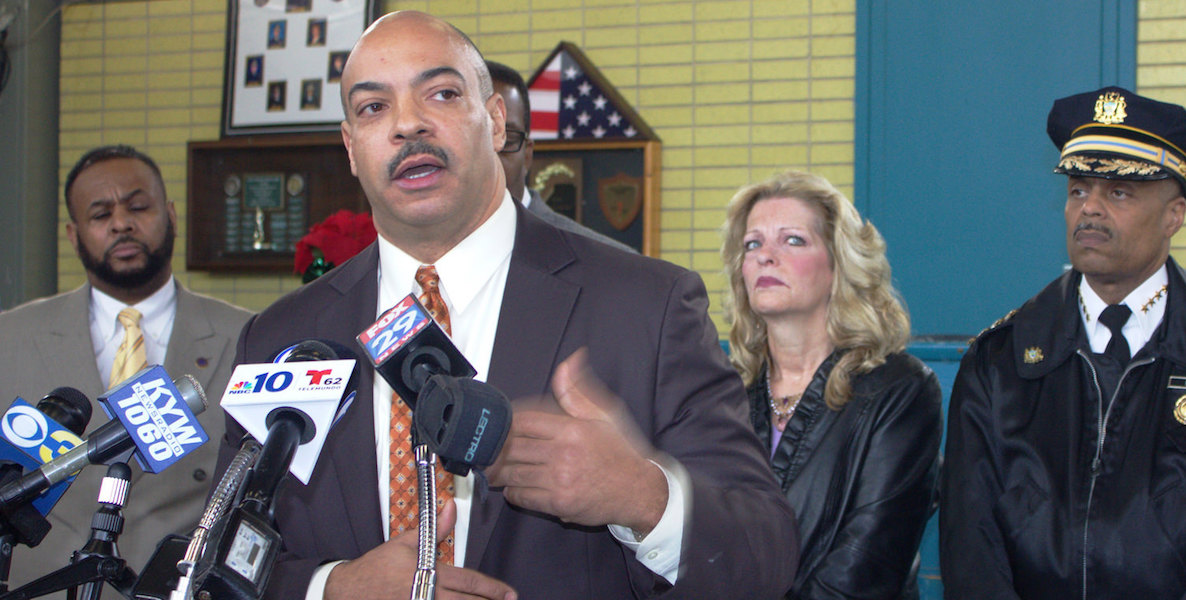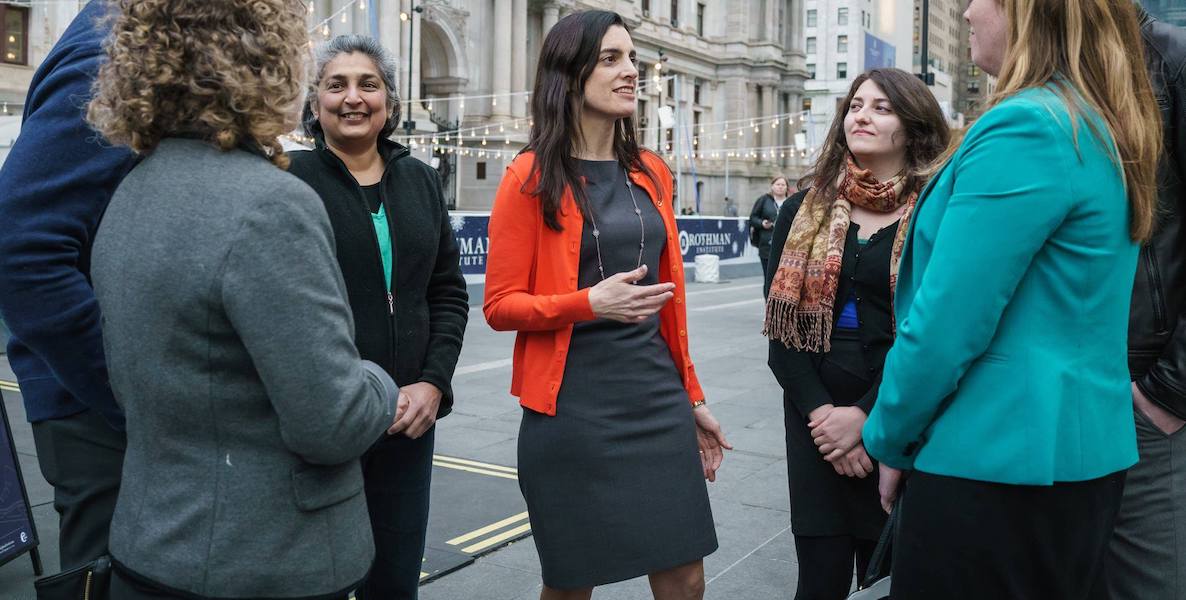Once upon a time in Philadelphia, there was an entrenched, corrupt political machine. The city was run by a privileged few in a government rife with corruption. I know, I know: The more things change…
Anyway, back then, two aristocratic lawyers—Richardson Dilworth and Joe Clark—sought to change all that. The swashbuckling Dilworth is who we remember today; Clark—elected mayor in 1951, before Dilworth succeeded him—has faded into the background by comparison.
That’s too bad, because in some ways Clark is more relevant than ever today. In May, incumbent Controller Alan Butkovitz will face challenger Rebecca Rhynhart in the Democratic primary for a position that, 68 years ago, Clark used to help clean up the city.
In 1949, reform in Philadelphia was jumpstarted when Dilworth and Clark ran against the Republican machine for, respectively, City Treasurer and City Controller. They waged their campaigns not against any one opponent, but against a sclerotic, insider-based system. When they improbably won, Time magazine observed: “After the exposure of graft, extortion, and embezzlement in nearly every city office, the smell from City Hall became too much even for torpid Philadelphians.” As recounted in Richardson Dilworth: Last of the Bare-Knuckled Aristocrats by Peter and Jonathan Binzen, Dilworth immediately recommended the abolishment of his own office: “There’s no sense in paying me or anyone else $15,400 a year to serve as a glorified cashier.”
Clark, however, set about using the powers of his new office to change the city. A new mindset for reform had taken hold, driven by young people who were taken by the high-minded, crusading leadership of these two patrician liberals. Clark as City Controller was right in the middle of it, using the powers of his office to expose financial shenanigans in city government. Suddenly, corrupt public officials were being exposed and prosecuted; between 1949 and 1951, at least six city workers committed suicide once their misdeeds came to light.
That power, to hear the 42-year-old Rhynhart tell it, is what she seeks to restore to an office that often makes headlines—with precious little reform living on after the press conferences. The job, as she sees it, is to “identify solutions that can save taxpayers millions of dollars—instead of playing the ‘gotcha’ game.”
Butkovitz, a ward leader and former state representative, has seemingly played the local fiscal watchdog role; in the latest example, it was his investigation of the misuse of the Mayor’s Fund that ultimately led former Mayor Michael Nutter to go through all sorts of meltdown, once calling the controller a “liar, a snake and a hypocrite.” But this election is really about the meaning of reform. When Butkovitz takes on Nutter, for all their petulant sniping back and forth, does that qualify? It might make for fun headlines, sure, but it’s hardly a challenge to the current political machine’s entrenched interests. Yes, Butkovitz makes headlines, but, in picking and choosing his spots, he tends to focus on exposing the scandals that present little or no political risk to him.
If nothing else, this election will be a step forward for Philadelphia if, during it, we talk about what it means to reform local government, and what skills and values are necessary to effect real change.
In a town where there’s a $6 billion pension shortfall—and Butkovitz sits on the pension board—his office seems to often opt for low-hanging, albeit rotten, fruit, like his investigation last year of City Hall’s mail room. “Mailroom Mayhem” he called it; yes, the mail room needs improvement, but Butkovitz’s breathless report seemed less like real reform and more like seeking headlines that don’t run the risk of pissing off the powers-that-be.
That’s why Rhynhart has called for Butkovitz to audit the Parking Authority, and why Butkovitz’s 2013 general election opponent Terry Tracy called on him to do what the Charter explicitly outlines in Article XII, Chapter 2, Section 210 and annually audit the School District in order to ensure that public funds are actually reaching public school classrooms. (“A summary of the annual audit shall be published by the Board once a week for three successive weeks, beginning the first week after the audit has been furnished to the Board, in two newspapers of general circulation printed in the City…”)
In fact, the Home Rule Charter that Dilworth and Clark helped bequeath to the city gave the Controller’s office widespread power to police local government’s “efficiency and effectiveness.” And therein lies the basis for Rhynhart’s platform. Rhynhart says the Controller’s office can do more than audit city departments in search of fiscal mismanagement; it can also investigate how government is serving its customers—and make recommendations to help it improve. “The office should also focus on modernization and studying and adopting best practices,” she says.
Rhynhart argues that the Controller needs to be independent of the political insider class. In that, she seems to be channeling Dilworth or Clark…save for her rhetoric. Those guys were bomb throwers who relished political fights. Full disclosure: I’ve always thought of reform in Philadelphia as just that type of political pugilism. Yet, at the same time that Rhynhart criticizes Butkovitz for not taking on the Democratic party’s sacred cows and unholy alliances, she critiques his combative style.
“An auditor should start with a decent relationship with the administration,” Rhynhart told me during a recent conversation. “This is not to say that the relationship might not become confrontational, but we should start from a place of collaboration. The way it’s been happening, the Controller holds a press conference in a ‘gotcha’ moment and the departments involved scramble to put together a PR response. Nothing about that moves the city forward.”
Rhynhart spent the last 9 years in mayoral administrations, first as Nutter’s Budget Director and then as Kenney’s Chief Administrative Officer. Before that, she was a Vice President at Bear, Sterns in New York. But she grew up in Abington and had always yearned to be in government; she moved back here, she says, to help “make government work for people.”
Rhynhart says the Controller’s office can do more than audit city departments in search of fiscal mismanagement; it can also investigate how government is serving its customers—and make recommendations to help it improve.
Under Kenney, she had some successes, like introducing reverse bidding, an innovative procurement reform. But her time in government only helped her to realize the perils in “trying to make City Hall more efficient from within,” she says. Governmental processes are so antiquated—don’t get her started on how paper forms slow up the already glacial pace of local government: “By not adopting new technologies, we’re wasting taxpayer money,” she says.
For his part, Butkovitz, who has accused his arch-enemy Nutter of putting Rhynhart up to challenge him, says that Rhynhart is no crusading outsider. At first blush, he may have a point: Putting a veteran of two mayoral administrations atop the fiscal watchdog that is charged with serving as a check on them may raise some living arrangement concerns of the fox and henhouse variety.
During our conversation, I kept probing whether Rhynhart is cut from the proper Dilworth/Clark cloth. But maybe there are other models besides bomb throwing. Her emphasis on collaboration and solutions may not be Dilworthian…but can it be reform?
Rhynhart, after all, moved back here at a heady time, the dawn of Nutter’s “New Way, New Day” and Obama’s “Yes, We Can” movements. In both instances, an army of technocrats expressed belief in government—and sought, with varying degrees of success, to make it work better. A lot of us thought they were naive, and we were disappointed. We felt that political reform can’t be done without getting your hands dirty in politics, like Dilworth and Clark had done.
I still think that’s true, but now that government is once again being run by those seemingly intent on destroying it, it’s refreshing to hear someone talk about solutions instead of seeming to play the transactional game we’re so accustomed to.
Can Rhynhart win? It’s going to be a heavy lift. Turnout in these off-year elections tends to be limited to the political apparatchik class in what Citizen columnist Jeremy Nowak has called “Moscow on the Delaware.” But her media message guru is one of the best in the business, J.J. Balaban of Neil Oxman’s The Campaign Group, and her political director is Kellan White, who can play the inside game. And Rhynhart says she’s confident she’ll reach her goal of raising $750,000 dollars, though it’s unclear how much that matters in what is essentially a ward election.
Alan Butkovitz is a formidable candidate, because he skillfully straddles some tricky lines. He balances some carefully curated high-profile feuds with his allegiance to the political status quo. If nothing else, this election will be a step forward for Philadelphia if, during it, we talk about what it means to reform local government, and what skills and values are necessary to effect real change.
Header photo by Lindsay Ouellette






